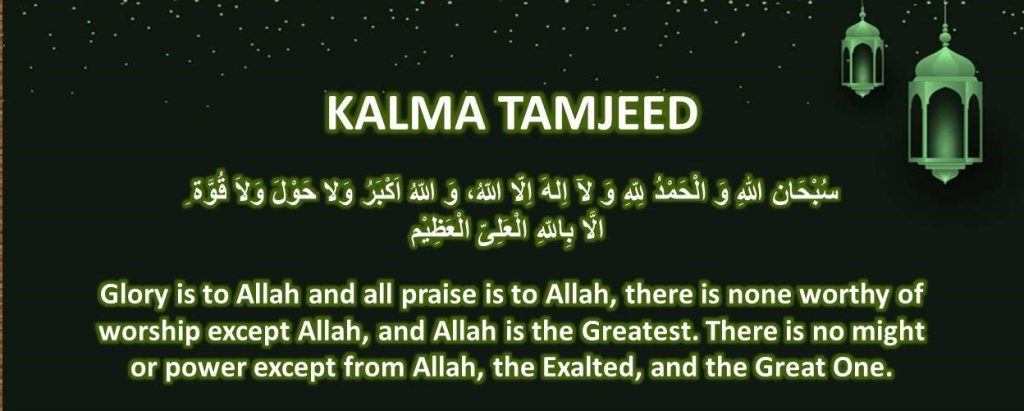Welcome to the informative blog by Umrah International, your trusted companion on your spiritual journey. In this post, we delve into the Third Kalma, known as Kalima Tamjeed. This essential declaration of faith not only encapsulates the essence of Islamic belief but also offers profound spiritual benefits to those who recite it with sincerity and understanding.
Understanding the Third Kalma
The Third Kalma, or Kalima Tamjeed, serves as a powerful testament to the majesty and perfection of Allah. This kalma is a celebration of Allah’s attributes and an affirmation of the oneness of the Creator, providing Muslims with a means to glorify Him in their daily lives.
The Arabic Text of the Third Kalma
The Third Kalma can be recited in Arabic as follows:
سُبْحَانَ ٱللَّٰهِ وَالْحَمْدُلِلّهِ وَلا إِلهَ إِلّا اللّهُ وَاللّهُ أكْبَرُ وَلا حَوْلَ وَلاَ قُوَّةَ إِلَّا بِاللّهِ الْعَلِيِّ الْعَظِيْم
Transliteration
In Romanized form, the Third Kalma reads:
Subhanallah walhamdulillah wala ilaha illallah wallahu akbar wala hawla wala quwwata illa billah aliyyil azeem.
English Translation
The meaning of the Third Kalma in English is:
“Glory be to Allah; Praise be to Allah; There is no God but Allah; Allah is Great; There is no power and no strength except with Allah, the Exalted, the Great One.”
This kalma encapsulates essential Islamic tenets, emphasizing Allah’s perfection and the believer’s dependence on Him.
The Components of the Third Kalma
Glorifying Allah
- Subḥānallāh (سُبْحَانَ ٱللَّٰهِ)
This phrase highlights the absolute perfection of Allah, affirming that He is free from any imperfection. It calls upon believers to acknowledge and reflect on Allah’s flawless nature. - Walḥamdulillāh (وَالْحَمْدُ لِلَّٰهِ)
This expression of gratitude acknowledges that all blessings come from Allah. It is an invitation for believers to cultivate a heart full of appreciation for Allah’s gifts. - Walā ilāha illallāh (وَلَا إِلَٰهَ إِلَّا ٱللَّٰهُ)
This phrase reinforces the central tenet of Islam: Tawhid, or the oneness of Allah. It is a declaration that no other deity is worthy of worship. - Wallāhu akbar (وَٱللَّٰهُ أَكْبَرُ)
This declaration of Allah’s greatness emphasizes His supremacy over all creation, highlighting that He transcends everything that exists. - Walā ḥawla walā quwwata illā billāhil-ʿaliyyil-ʿaẓīm (وَلَا حَوْلَ وَلَا قُوَّةَ إِلَّا بِاللَّٰهِ الْعَلِيِّ الْعَظِيمِ)
This phrase underscores the believer’s complete dependence on Allah for strength and guidance, reminding us that all power originates from Him alone.
The Significance of Glorification in Daily Life
By incorporating the Third Kalma into daily routines, Muslims can foster a closer connection to Allah. This kalma serves as a spiritual anchor, reminding believers of their purpose and reinforcing their faith.
The Spiritual Benefits of the Third Kalma
The recitation of the Third Kalma comes with numerous benefits that impact both this life and the Hereafter:
1. Divine Favor and Love
Reciting Kalima Tamjeed is among the most beloved forms of worship to Allah. It strengthens the believer’s relationship with the Creator and fosters a sense of divine love and connection.
2. Inner Peace and Serenity
The act of glorifying Allah promotes a sense of calm and tranquility, helping believers navigate life’s challenges with resilience. Regular recitation serves as a reminder of Allah’s presence and support.
3. Forgiveness of Sins
The Third Kalma plays a significant role in seeking forgiveness. When recited sincerely, it reflects humility and repentance, aiding believers in their quest for divine mercy.
4. Elevation in Spiritual Rank
According to various hadiths, frequent recitation of the Third Kalma contributes to elevating one’s status in the Hereafter. It serves as a reminder of the eternal rewards awaiting those who strive to glorify Allah.
5. Protection from Hellfire
Islamic teachings indicate that those who consistently recite the Third Kalma will be safeguarded from Hellfire. This serves as an encouragement for believers to make it a part of their daily worship.
6. Strengthening Faith
The Third Kalma reinforces the foundations of faith, encouraging believers to live in accordance with Islamic principles. It instills a sense of purpose and commitment to one’s spiritual journey.
Hadith Emphasizing the Importance of the Third Kalma
Numerous hadiths highlight the significance of the Third Kalma in the life of a believer. One such narration from Sahih Muslim states:
“The most beloved speech to Allah consists of four phrases; there is no harm with which one you begin: Subhana Allahi, wal hamdu lillaahi, wa la ilaaha il-lallah, wa Allahu akbar.”
— [Sahih Muslim 2137]
This hadith underscores the immense value Allah places on these phrases, encouraging their regular recitation.
Practical Tips for Incorporating the Third Kalma into Daily Life
To fully benefit from the Third Kalma, here are some practical ways to incorporate it into your daily routine:
Morning and Evening Rituals
Start and end your day with the recitation of the Third Kalma. This practice can serve as a spiritual bookend, framing your daily activities in gratitude and reverence.
During Salah (Prayer)
Incorporate the Third Kalma into your prayers to deepen your connection with Allah. It serves as a powerful reminder of His greatness during moments of worship.
In Times of Distress
Whenever you face challenges or stress, reciting the Third Kalma can provide comfort and reassurance. It reinforces your trust in Allah’s guidance and power.
Reflecting on the Meaning
Take time to reflect on the meanings of each phrase in the Third Kalma. Understanding its implications can enhance your spiritual experience and commitment to worship.
Conclusion
The Third Kalma, Kalima Tamjeed, is a profound reminder of Allah’s greatness and a vital part of a Muslim’s spiritual practice. Its recitation fosters a deeper understanding of Islamic beliefs and enhances the connection between the believer and Allah.
At Umrah International, we encourage you to embrace this beautiful declaration in your daily life, allowing it to enrich your spiritual journey. May your recitations bring you peace, forgiveness, and a closer relationship with your Creator.
















